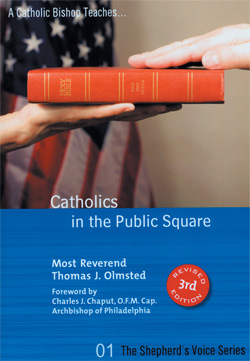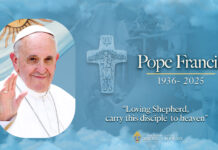 Bishop Thomas J. Olmsted released the third edition of “Catholics in the Public Square” in September. The booklet provides Catholics with, among other things, a guide to making a well-informed vote. You can read the booklet in its entirety here: www.diocesephoenix.org/catholics-in-the-public-square.php
Bishop Thomas J. Olmsted released the third edition of “Catholics in the Public Square” in September. The booklet provides Catholics with, among other things, a guide to making a well-informed vote. You can read the booklet in its entirety here: www.diocesephoenix.org/catholics-in-the-public-square.php
This question addresses voting specifically:
13) Should Catholics take into account their own faith at the moment of voting?
It only makes sense that if Catholics are supposed to live their faith in all of their daily activities that they should also take their faith into account while voting. As noted in the Second Vatican Council’s teaching, “every citizen ought to be mindful of his right and his duty to promote the common good by using his vote.” (Gaudium et Spes, 75)
In preparing to vote, Catholics need to understand their faith so that their consciences are properly formed. Subsequent to this formation, it is important to research all of the important issues and candidates that will appear on the ballot. Only after sufficient preparation and prayer, is a Catholic fully ready to discharge his or her responsibilities as a faithful citizen and cast a meaningful vote.
These questions also mention voting:
19) What are the causes that can ban Catholics from Holy Communion?
No one who is conscious of having committed a serious sin should receive Holy Communion. For the Eucharist is the very Body and Blood of Jesus Christ, our most precious gift in the Church. And St. Paul warns us (I Cor 11:27-29): “Whoever eats the bread or drinks the cup of the Lord unworthily will have to answer for the body and blood of the Lord. A person should examine himself, and so eat the bread and drink the cup. For anyone who eats and drinks without discerning the body, eats and drinks judgment on himself.”
All Catholics should examine their consciences, and refrain from receiving Holy Communion if they are not living in a proper state of grace. Should some Catholic politicians who are presently pro-abortion obstinately persist in this contradiction to our faith, this becomes a source of scandal. In these and similar cases, measures beyond those of moral persuasion may need to be taken by those in leadership in the Church. As God tells us in the Book of Leviticus (19:16), “You shall not stand by idly when your neighbor’s life is at stake.”
If a politician is actively supporting and furthering the culture of death, he is not only causing scandal; he is sinning. Similarly, when a politician performs actions (like voting) that allow for abortions and even promote abortions, or that mandate the distribution of contraceptives by pharmacists and others, that politician is materially cooperating in grave sin. When this occurs, then the politician cannot receive Holy Communion without previously making a good confession. A good confession would require sincere sorrow for such sin and a firm purpose of making amendment. Since the harm done would be public in nature, the amendment should also be public.
27) What means should Catholics employ to manifest their convictions about issues in the public square?
There are various means that Catholics may legitimately employ to manifest their convictions about issues in the public square. Catholic elected officials, for example, are in a privileged position to make known their opposition to public policy issues that are intrinsically evil.
Because of the democracy in which we live, even those who are not in political life have an opportunity and responsibility to express their opinions on various issues and to vote in elections.
Although voting is an important way of expressing convictions about issues, Catholics need not wait for elections to express their views. Letters to the editor, organized public events, and communicating with elected officials are also good examples of expressing views and bringing about change in the public square.





